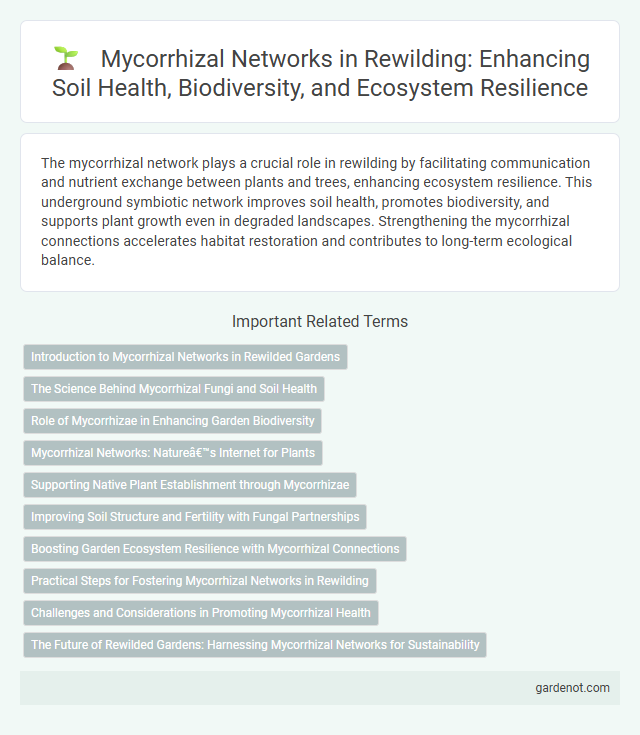The mycorrhizal network plays a crucial role in rewilding by facilitating communication and nutrient exchange between plants and trees, enhancing ecosystem resilience. This underground symbiotic network improves soil health, promotes biodiversity, and supports plant growth even in degraded landscapes. Strengthening the mycorrhizal connections accelerates habitat restoration and contributes to long-term ecological balance.
Introduction to Mycorrhizal Networks in Rewilded Gardens
Mycorrhizal networks are symbiotic associations between fungi and plant roots that enhance nutrient uptake and soil health in rewilded gardens. These underground networks facilitate communication and resource sharing among diverse plant species, promoting ecosystem resilience and biodiversity. Incorporating mycorrhizal fungi into rewilding projects supports natural soil processes that restore nutrient cycles and improve plant growth.
The Science Behind Mycorrhizal Fungi and Soil Health
Mycorrhizal fungi form symbiotic relationships with plant roots, creating extensive underground networks that facilitate nutrient and water exchange essential for soil health. These fungi enhance soil structure by increasing organic matter decomposition and promoting microbial diversity, which improves nutrient cycling and plant resilience. Research shows that mycorrhizal networks significantly boost carbon sequestration, contributing to ecosystem restoration and rewilding efforts.
Role of Mycorrhizae in Enhancing Garden Biodiversity
Mycorrhizal networks enhance garden biodiversity by facilitating nutrient exchange between soil fungi and plant roots, promoting healthier and more resilient plant communities. These symbiotic relationships improve soil structure and increase plant resistance to pests and diseases, supporting a diverse range of flora. By connecting different plant species underground, mycorrhizae create a cooperative ecosystem that boosts overall garden productivity and ecological balance.
Mycorrhizal Networks: Nature’s Internet for Plants
Mycorrhizal networks consist of vast underground fungal threads connecting plant roots, facilitating nutrient exchange and communication. This natural "internet" enhances plant resilience, biodiversity, and ecosystem stability by distributing water, minerals, and chemical signals across large forest areas. Rewilding efforts leverage these networks to restore degraded landscapes, promote native vegetation growth, and improve soil health sustainably.
Supporting Native Plant Establishment through Mycorrhizae
Mycorrhizal networks play a crucial role in supporting native plant establishment by facilitating nutrient exchange and enhancing soil structure. These symbiotic fungi connect plant roots, enabling improved water and nutrient uptake essential for the growth of native species in rewilding projects. Restoring mycorrhizal communities accelerates ecosystem recovery by promoting plant diversity and resilience.
Improving Soil Structure and Fertility with Fungal Partnerships
Mycorrhizal networks form symbiotic relationships with plant roots, enhancing soil structure by binding soil particles into stable aggregates that improve aeration and water retention. These fungal partnerships facilitate nutrient exchange, increasing the availability of essential elements such as phosphorus and nitrogen, which boosts soil fertility. By promoting diverse microbial activity and organic matter decomposition, mycorrhizal fungi contribute to long-term ecosystem resilience and rewilding success.
Boosting Garden Ecosystem Resilience with Mycorrhizal Connections
Mycorrhizal networks play a crucial role in boosting garden ecosystem resilience by facilitating nutrient exchange and improving soil health. These symbiotic associations between fungi and plant roots enhance water absorption, increase resistance to pathogens, and promote plant diversity. Strengthening mycorrhizal connections supports robust plant growth and contributes to a sustainable, self-regulating garden environment.
Practical Steps for Fostering Mycorrhizal Networks in Rewilding
Enhancing mycorrhizal networks in rewilding projects involves inoculating native plants with locally sourced mycorrhizal fungi to promote root symbiosis and nutrient exchange. Incorporating diverse plant species with varying root structures encourages a robust fungal network, boosting soil health and ecosystem resilience. Limiting soil disturbance and avoiding synthetic chemicals preserves existing fungal networks, facilitating natural regeneration and improved plant establishment.
Challenges and Considerations in Promoting Mycorrhizal Health
Promoting mycorrhizal health in rewilding efforts requires addressing soil degradation and contamination that disrupt fungal networks critical for plant nutrient exchange. Ensuring biodiversity by fostering native fungal species over invasive or pathogenic strains remains a challenge due to altered land use and climate fluctuations. Effective management involves carefully balancing soil pH, organic matter content, and moisture to support robust symbiotic relationships essential for ecosystem recovery.
The Future of Rewilded Gardens: Harnessing Mycorrhizal Networks for Sustainability
Mycorrhizal networks play a crucial role in rewilded gardens by enhancing plant communication, nutrient exchange, and soil health, which promotes long-term ecological resilience. Harnessing these symbiotic fungal connections supports sustainable gardening practices, reducing the need for chemical fertilizers and boosting biodiversity. Future rewilded gardens will rely increasingly on mycorrhizal networks to restore degraded soils and create self-sustaining ecosystems.
Mycorrhizal network Infographic

 gardenot.com
gardenot.com